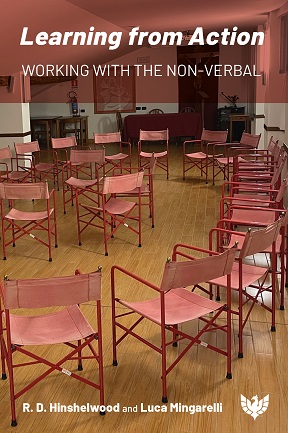Learning from Action: Working with the Non-verbal

Book Details
- Publisher : Karnac Books
- Published : 2022
- Cover : Paperback
- Pages : 296
- Category :
Group Psychotherapy - Catalogue No : 96446
- ISBN 13 : 9781912691210
- ISBN 10 : 9781912691
Reviews and Endorsements
Human relationships and mental distress are vastly complex and multifactorial. It is obvious, and at the same time a paradox, to realise that the most intensively trained and self-conscious practitioners are the ones who are able to facilitate the most secure and bounded interactions, with the greatest outcomes in mental health. To be able to use the "ordinary" as therapy requires great skill and humility or, as some authors name it, a "complex simplicity". The quality of democratic therapeutic communities is evident in the various chapters presented. The most intense learning a human being goes through is in the first two years of life before the ability to communicate verbally. During this period, genes reorganise themselves and brain structure changes dramatically. The baby learns through action and the reflection that others leave and return. Psychological organisation, in this way, is not down to the individual but is a dialogical process and a multidirectional system. What this book effectively demonstrates is the "complex simplicity" of using the ordinary daily activities and interactions as therapy. Instead of reducing relationships to the "technical-rational" and the still-dominant model of science with its linear causality, the authors remain daringly focused on the complex dance between implicit and explicit levels of communication. This book is a masterful contribution to the discussion.
João Pereira, clinical director, Romão de Sousa Foundation; founder, Open Dialogue Portugal; president, INDTC Portugal
'This excellent book addresses the crucial issues that the therapeutic communities were conceived to deal with and shows the potential benefits arising from regular involvement in the Learning from Action (LfA) programme. The LfA workshop was set up as an experiential setting for participants to begin to reflect on the dysfunctional processes of role-recruitment and hidden communications, which tend to become unconsciously cocooned in the institutional body of psychiatric services. As R. D. Hinshelwood quite rightly points out, psychiatry is hugely influenced by the basic assumption that "the psychiatrist and psychiatric nurse know best". But should we actually start from that assumption? The implicitly accepted roles of passive patient and active carer can interfere with the task of helping patients to become active participants in their own treatment.'
Matteo Biaggini, psychologist and Jungian psychoanalyst; former head of publishing, Il Porto Therapeutic Communities
Like sitting at the feet of Gamaliel.
There is a genius in the Learning from Action (LfA) conferences, in the understanding of action as communication, of the everyday as a rooted expression of the being of being human; it is not just in the office or study or consulting room that being is transformed into useful meaning, but in everyday reflective shared living. This is expressed in what is a very straightforward, accessible, and complex book which operates, like the conferences themselves, at multiple levels. Through its richness of experiences, perspectives, interpretations and histories - inside, outside, and in what comes after - it is a practical instruction manual for something which cannot be manualised; a laboratory for research and exploration. As an archivist and historian engaged with therapeutic community for most of my adult life, Learning from Action is a unique historical/archival document. The conferences were created and developed at the turn of the millennium by leading figures in European group and psychosocial therapy. They ran uninterrupted for twenty years, developing a self-replicating culture of innovation and learning. Then the pandemic struck, and the initiators, developers, and experienced members were faced by the trauma familiar to the clients of their therapeutic institutions, of a rupture of continuity, belonging, and home territory. Generally, when institutions hit a wall, they rapidly fragment into aerosols of memory and documentation, as do people, and the work of reintegration takes years of difficult reconstruction. This is the work for archivists, researchers, and therapists. Here, we have an organisation which adapted. Here we have modelled, in a book which is ostensibly about the history and practice of the LfA conferences, how the community itself works and responds to concrete existential challenges seen as opportunities for reflective learning. It models in content and structure the continuity of culture of LfA, and by doing so gathers memory and documented experience into a research tool, making the inner life of the culture visible, becoming a primary source of a kind which is rarely produced economically by living organisations. We are holding the life and working of the LfA conferences in our hands. The fact, basis, and mechanics of continuity are created and implemented as we watch. It creates rich material for study.
Reading Learning from Action from the perspective of someone who lived and worked in a therapeutic community for ten years; and who co-created residential living/learning/working communities for former members of therapeutic communities, engaging with their identity, history and archives (we called them "Archive Weekends"), I found myself in that exciting space where ideas start having themselves and generalising into the lived fabric of the world. The authors and editors explore and model their creative and adaptive response to the trauma of the disruption of the LfA community, adapting to continue the acquisition of knowledge and learning across the rupture. I understood myself, my work, and my experience of both better. It's an experience I can recommend.
Dr Craig Fees, founding archivist, Planned Environment Therapy Trust Archive and Study Centre (retired); honorary research fellow, History of Medicine, University of Birmingham
This remarkable book helped me to gain a better understanding of the mechanics of unconscious messaging […] Everyone should read this book.
Jane Cooper, former senior university counsellor, ‘Therapy Today’ March 2023

